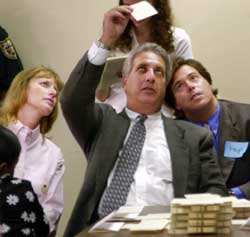Americas

U.S. Elections 2004
World Fears U.S. Election Chaos
 |
|
Reviewing ballots in Palm Beach County, Florida on November 11, 2000. (Photo: Bruce Weaver/AFP-Getty Images) |
Ever since George W. Bush won Florida by a mere 537 votes in the presidential election four years ago, the world has increasingly voiced doubts about the voting process in the United States.
Now, many foreign observers are predicting that US electoral history will repeat itself.
"No need to wonder if this year’s US presidential election is headed for another meltdown: the meltdown has already started. The voting machines have already begun to break down, accusations of systematic voter suppression and fraud are rampant, and lawyers fully armed and ready with an intimate knowledge of the nation’s Byzantine election laws have flocked to court to cry foul in half a dozen states," wrote Andrew Gumbel in the UK Independent (October 25).
He goes on to wonder how American leaders can "talk idealistically about exporting American freedom and democracy to Afghanistan, Iraq and beyond."
The "biggest legal battle in US election history looms," according to Scotland's Sunday Herald (October 24), whose correspondent, Claire Prentice, reported that "an unprecedented number of lawsuits have been filed, challenging basic election rules. Lawyers are flooding into Florida, Ohio, Pennsylvania and other battleground states."
"Half Say U.S. Vote's Fixed" ran a headline in the London Mirror (October 25). The paper's New York correspondent, Anthony Harwood cited a Time magazine survey revealing that 48 per cent of America voters "are still either 'very worried' or 'somewhat worried' that whoever emerges on top will not be the real election victor."
"Let there be no misunderstanding: America is truly a free country and, for Germany in particular, a role model of democracy," editorialized Robert Leich on the Website of Germany's weekly, Die Zeit. "For that very reason, it is all the more grotesque that the ground rules of democracy in the 'mother of all democracies' can not be convincingly enforced but, rather, are sinking beneath an embarrassing debacle."
The world media is again turning its attention to the state of Florida where roving foreign correspondents are reporting an inauspicious beginning to Florida's election season.
Conor O'Clery of the Irish Times (October 19) observed that "problems are already emerging in Florida" and that "legal actions challenging the [voting] machines and voter registration are already under way with dozens of lawyers engaged by both main parties."
"The psychodrama of 2000 still casts a shadow over the state that was the setting of the historic election shambles," noted Hélène Vissière, who is covering the elections for France's Le Point (October 21). "Four years later, the fight between Republicans and Democrats will be merciless. [T]he people of Florida are more skeptical than ever about the transparency of their electoral process."
Does India have something to teach the U.S. when it comes to voting systems?
Eric Weiner, writing in the Bangladesh Independent (October 20), suggested that it does. "While we in the United States agonize over touch screens and paper trails, India managed to quietly hold an all-electronic vote. In May, 380 million Indians cast their votes on more than 1 million machines. It was the world's largest experiment in electronic voting to date and, while far from perfect, is widely considered a success."
Arguing that the $3000 American voting machine is more "vulnerable to wholesale fraud" than its $200 Indian counterpart, Weiner posed the question: "How can an impoverished nation like India, where cows roam the streets of the capital and most people's idea of high-tech is a flush toilet, succeed where we have not?"
The Times of India (October 26) also found it interesting to draw comparisons between India's voting practices and those of the United States. "If you thought voting machines were a menace only in India, think again…Although the [American] government has equipped voting booths with touch screens to do away with the problems, voters are also scared that if the system collapses their votes will be lost forever."
The same paper ran an interview with K Jagannatha Rao, the advisor of the Election Commission of India. Having investigated electoral fraud in strife-ridden Afghanistan, Rao was preparing to fly to the United States at the invitation of the Global Exchange International, a NGO. Rao will monitor the U.S. presidential elections from the political inferno of Ohio. According to the India Times, "he will precisely be doing what he has been doing in India — investigating poll frauds."







